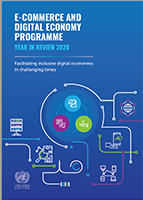Since the COVID-19 pandemic struck our economies and societies, digital solutions have been used more than before to maintain economic and social activities in times of various lockdown measures and travel restrictions. At the same time, the wide gaps in digital readiness became even more apparent. Recent developments have further shown the wisdom of member States when they back in 2016, at the UNCTAD Ministerial in Nairobi, decided to strengthen UNCTAD’s work on enhancing development gains from the digital economy and e-commerce. Their perspicacious actions laid the foundation for what evolved into the E-commerce and Digital Economy (ECDE) Programme.
Our economies are being transformed at record speed as more and more people, governments and businesses go digital. The rapid development of the digital economy is disrupting production, consumption and trade patterns, significantly affecting the achievement of the Sustainable Development Goals. Impacts will depend on policies and the readiness of countries, enterprises and people to take advantage of digitalization, and its benefits will not be equally distributed. Significant efforts are needed to create a more inclusive digital economy.
The pandemic has added urgency to the need for action. It has taken a huge toll in terms of lives and it plunged the world into a deep recession. At the same time, it has accelerated various digital transformation processes around the world. Digital solutions for telemedicine, telework, online education and – not least – e-commerce have been increasingly used to keep economic and social activities going, most likely with lasting effects. Without adequate actions, inequalities will widen even more.
Digital divides, differences in readiness and the high concentration of digital market power all point to the need for new policies and regulations to create a fairer distribution of gains from digital transformations. Finding suitable solutions will require effective international collaboration and policy dialogue, with the full involvement of developing countries.
The ECDE Programme has a key role to play in this context. It was set up with the aim of helping to reduce inequality, enable the benefits of digitalization to reach all people and ensure that no one is left behind – nor left offline – in the evolving digital economy. This overall goal has become even more important to achieve due to the pandemic and to support the recovery efforts. This Year in Review is the first assessment of the work done under the common programmatic vision of the ECDE Programme. It focuses on activities that took place during 2020 and highlights key achievements related to its work to build knowledge, capacity and consensus. In doing so, it applies the Programme’s monitoring and evaluation system for measuring results, with a view to ensuring a robust and results-driven approach to programme management and monitoring.
I would like to express my appreciation to the growing number of member States that are turning to UNCTAD for assistance to help them achieve more inclusive outcomes of the evolving digital economy. I am also grateful to our peer organizations in the eTrade for all initiative, for their commitment to connect the dots and work for a digital and sustainable future for all. Finally, growing trust and funding from development partners are essential for this Programme to fulfil its potential in this Decade of Action.
Shamika N. Sirimanne
Director, Division on Technology and Logistics


